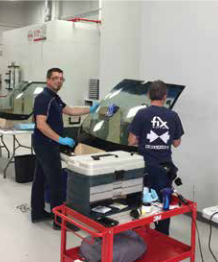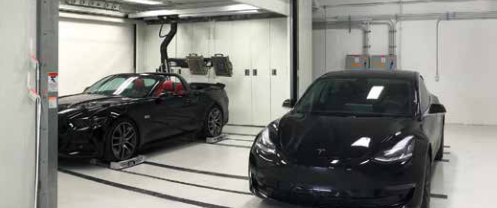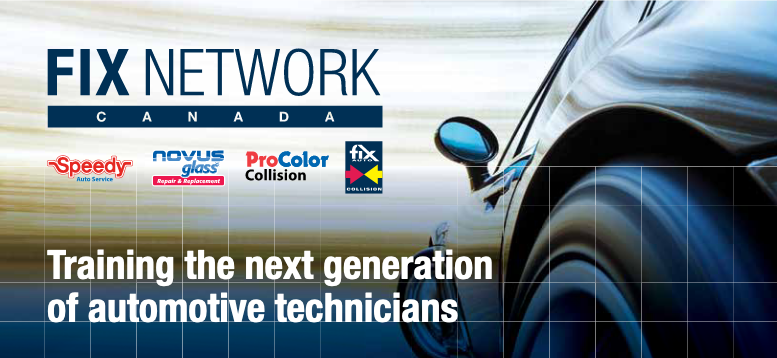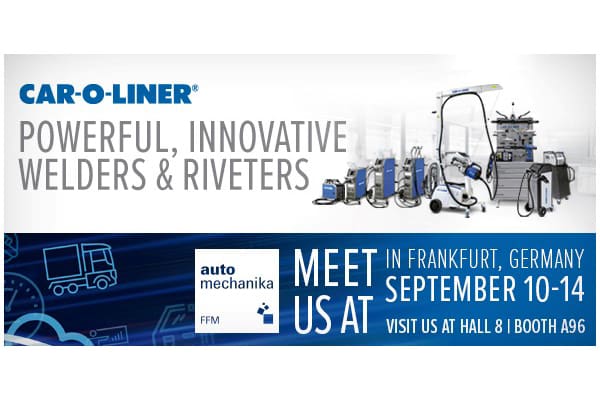The automotive aftermarket industry is undergoing rapid changes as customer expectations evolve and vehicles become more technologically advanced. This acceleration of digital innovation is reshaping the career journey of automotive technicians.
Traditionally, individuals who work in the automotive aftermarket industry have an affinity for cars and how things work. That basic skillset is still an important starting point for a career in this industry. But the training and expertise required today to earn certification has evolved to a new level. Auto technicians need to understand complex on-board technologies, drive trains, computer and electrical systems. They must also have a solid working knowledge of tools and techniques like smart welding, spray guns, vehicle diagnostic systems and more.
Recognizing the need in the industry for continuous learning and development, Fix Network, the leading automotive aftermarket network in Canada, launched its first Training Centre in Milton, Ontario last year. This year, a new training facility opened at the company’s headquarters in Blainville, Quebec with 6,000 square feet of shop space and a separate 18 seat classroom. A third training centre is in progress in Calgary, Alberta.
“The training centre has been a project in the making for the last five years,” said Yves Roy, Fix Network’s Regional Vice President for Quebec. “The unique concept of replicating a complete shop environment will support our network for many years to come.”
The purpose of this training centre is to give new as well as seasoned technicians the opportunity to update their skills and knowledge. Depending on their experience and skill level, technicians could spend anywhere from a few weeks to a year at the facility.
“The training centre isn’t just a facility. It’s a complete program that will help improve the skillset of apprentice in any phase of the repair process,” said Roy. “The program gives them hands-on experience using the latest tools and technologies in the shop space as well as the educational courses on all aspects of the business, from estimating to customer experience.”
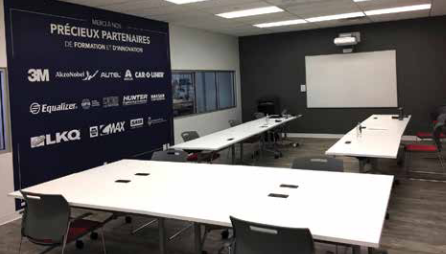
Technologically advanced training
The training centre consists of three dedicated spaces for collision, glass and mechanical training. The entire facility is outfitted with the latest tools and technology to repair and service any vehicle that rolls through the shop door. While each trade is different, the one thing they have in common is today’s modern, complex vehicles.
The network’s franchise owner-operators can send their technicians to the training centre to get hands-on experience in the latest equipment. It is also great for apprentices that need to hone their skills in a fully functioning collision, mechanical and auto glass shop environment.
The equipment includes a fully equipped downdraft Global Finishing Solutions spray booth, complete with a REVO Infrared Accelerated Curing System. A prep area functions as a complete downdraft paint booth with its own REVO drying system. Compressed Air Centres by Kaeser take care of the compressed air needs. All of the spray guns used in the booth are top-of-the-line entries provided by SATA Canada. The aluminum repair room is equipped with Car-O-Liner frame equipment, Car-O-Liner welding system and Car-O-Liner measuring system.
The facility also includes the Quick Check Drive, Quick Tread Edge and Revolution systems from Hunter Engineering. These systems offer unprecedented speed and accuracy. For example, the Quick Check Drive alignment inspection system can scan a vehicle every three to five seconds. Quick Tread Edge seems to have been designed with a similar philosophy in mind. The drive-over system from Hunter automatically measures the tread depth of each tire from edge to edge in seconds. Hunter Engineering touts the Revolution as a truly one-of-a-kind tire changing machine, winning numerous awards since it was first introduced.
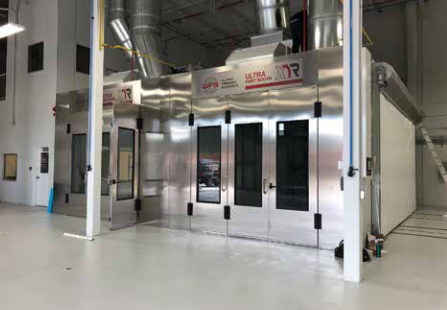
Investing in future generations
Fix Network wants to play a role in solving the lack of people coming to the industry. It is building associations and partnerships with suppliers and franchisees as well as working closely with trade colleges to identify and create opportunities for the next generation to learn about the industry, improve their skills and fi nd a meaningful long-term career.
The training centres are designed to meet the ongoing development needs for individuals working in the Network’s four brands: Fix Auto, ProColor Collision, NOVUS Glass and Speedy Auto Service. However, they are only one piece of the bigger investment that Fix Network is making in developing the next generation of automotive technicians.
In this past year, the company has consolidated its National Training team and developed a comprehensive curriculum based on the role as well as a personalized learning path by brand. Topics covered include quality control, parts management, shop systems and software, and customer service. One of the courses, Estimation 1.0, introduces the basics to less experienced estimators; this is something not currently offered anywhere except in private schools. Another course is Orientation, which provides a consistent and standardized way of operating for network franchise partners and their employees.
These courses are offered in a modern classroom setting. Instructors can easily call up the latest in audio-visual material on the built-in large screen at the front of the class. The desks are arranged in a U-formation, allowing for demonstrations to be conducted in front of all students. Each desk is equipped with power to plug in laptops or other devices.
When the pandemic started, the Network adapted its live training courses to a successful virtual format. In the fall, the company will launch Ignite, a new online learning management system for its franchise partners. It is also exploring new methods of training, such as video-based and virtual reality formats, among others.
Fix Network is also supporting its shops to attain I-Car certification by providing live classes, including welding courses for Gold Class certification as well as training plans and support throughout the process. The training centres are I-Car certified Gold Class Aluminum.
Looking ahead, Fix Network is working on a new program aimed at foreign workers to introduce them to the Network and the industry overall. As Canada continues to be a preferred destination for skilled immigrants, the program seeks to help talented individuals update their technical skills and meet the high safety standards required in the Canadian automotive aftermarket industry.
